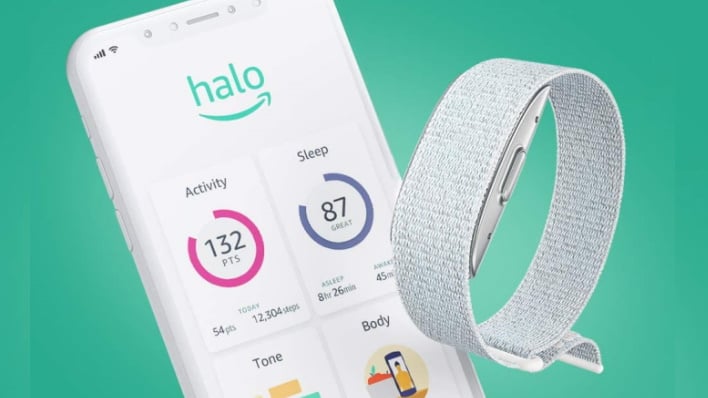Amazon Launches Halo Fitness Band And App To Detect Body Fat And Track Your Activities

In the future, we may have AI become a part of our brains to monitor every aspect of our body and control objects in the real world. In the meantime, we will have to stick to utilizing AI in our devices to catch the things we cannot. Today, Amazon is introducing AI-powered Amazon Halo, “a new service dedicated to helping customers improve their individual health and wellness.”
Amazon Halo (not like the other Halo) is a health and wellness app paired with the Halo Band. The band consists of an “accelerometer, a temperature sensor, a heart rate monitor, two microphones, an LED indicator light, and a button to turn the microphones on or off, among other functions.” The device is also water-resistant (not IP rated seemingly), charges in 90 minutes for seven days of use, and the bands come in a variety of materials and colors. The goal is to simplify health and wellness by not having a screen on the device. It makes it much simpler to use and approachable for all people while still providing accurate data.
The data that the watch collects is then sent over to the Halo app, which processes it into five different categories:
Activity: The first category is activity, in which the American Heart Association provides activity guidelines and the app awards “points” based on your movements in comparison to guidelines. The weekly goal is 150 points, with points being deducted if you are sedentary and extra points being added for more intense activities.With all this health and possibly personally identifiable information being collected, privacy would be a big concern. Amazon tackles this by stating that “Privacy is foundational to Amazon Halo, and multiple layers of privacy and security are built into the service to keep data safe and in customers’ control.” They have baked in encryption with the data, automatically delete images and recordings, and do analysis on voice data locally. The data, however, could be used with third-party integrations which users can opt-in or out if they so choose.
Sleep: The next category is sleep and sleep tracking. According to the press release, “Amazon Halo uses motion, heart rate, and temperature to measure time asleep and time awake; time spent in the various phases of sleep including deep, light, and REM; and skin temperature while sleeping.” This category will also score you on your sleep out of 100 points when you wake up (I probably would get a C if this were equated to grades).
Body: Following the sleep category, using computer vision and machine learning, the Halo Band and app can calculate body mass index (BMI). They claim that this is “as accurate as methods a doctor would use—and nearly twice as accurate as leading at-home smart scales.”
Tone: Not only does the band monitor physical health, but “social and emotional” health too. The tone feature also uses machine learning to analyze your “energy and positivity” to help you understand how to improve your emotional well-being.
Labs: Finally, the Labs category gives customers “science-backed challenges, experiments, and workouts” tailored to each person. This category will combine a large quantity of content from many providers, such as the American Heart Association, Mayo Clinic, Headspace, and others.

This move to get into the smart-band market seems to be a play against Google from when they acquired FitBit. If Google gets to collect data, then Amazon wants to as well. To me, some of the features seem like extra-data collection points and are closer to “magic stress stones” than scientific data. I digress, however. It will be interesting to see how everything plays out with this new device, and if it competes well in the smart-band market.

